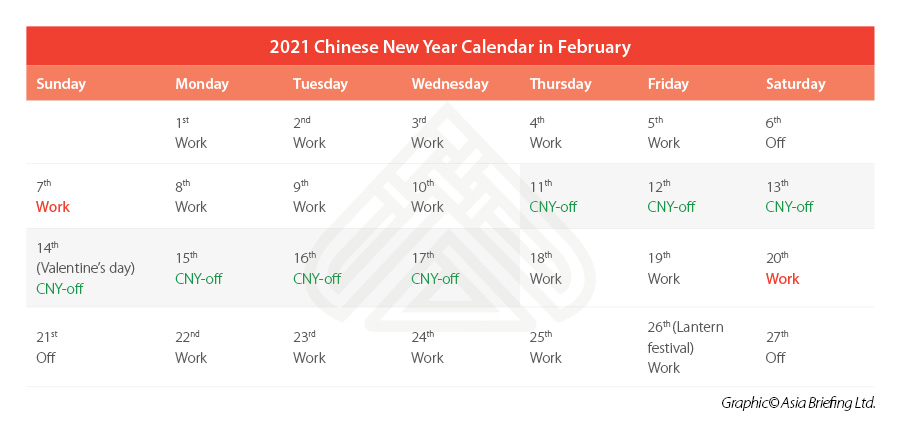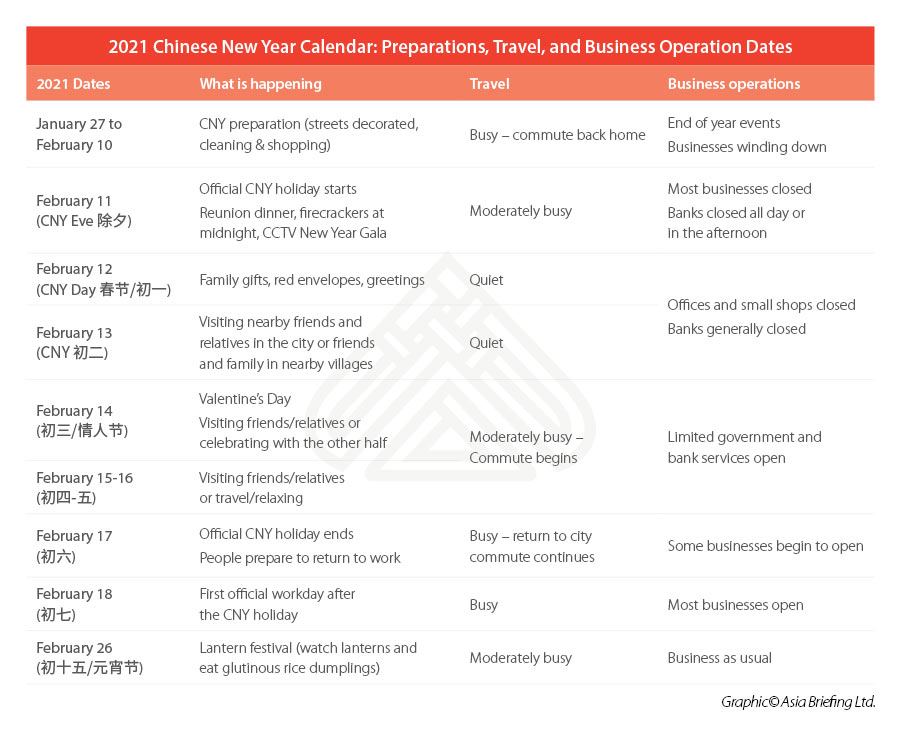2021 Chinese New Year: How Foreign Businesses Should Prepare in the COVID Context
The 2021 Chinese New Year will be an abnormal one due to disruptions caused by the COVID-19 outbreaks and restriction measures. The holiday and COVID-19 control measures may hinder business travelling and interprovincial business events for longer than usual. Foreign businesses with supply chains in China should stay in touch with your Chinese suppliers, prepare inventory stock, ensure product quality control, and settle payment beforehand to avoid any supply chain disruption. In the post-virus era, with the booming e-commerce Chinese market, foreign investors may consider breaking into Chinese markets and taking advantage of the spending frenzy during the Spring Festival.
Chinese New Year (CNY), also known as the Spring Festival or Lunar New Year, is the most anticipated and celebrated Chinese holiday. But for many businesses, it can be a disruptive time that requires advance planning and strategy.
In 2021, the CNY falls between February 11 and 17 – after the CNY’s Eve on February 11, the Year of the Rat will pass into the Year of Ox on February 12. HR managers should note that to compensate for the long CNY holiday break, China marked February 7 (Sunday) and February 20 (Saturday) as additional official workdays.
Mass migration and COVID-19 restriction policies
Normally every CNY, millions of Chinese workers will travel back to their hometown to reunite with their families and friends, as a tradition. However, due to the COVID-19 pandemic, this year’s Spring Festival travel rush, known as Chunyun in Chinese, is predicted to be the least busy in 18 years.
With the recent recurring COVID-19 outbreaks in Heilongjiang, Jilin, Hebei, and Beijing, where lockdowns and other control measures have affected tens of millions of people, local Chinese governments are calling for citizens to stay put and “celebrate in place”.
Worrying that the virus could spread more deeply into the country’s vast rural areas during mass human migrations, the State Council ordered local authorities to prioritize epidemic prevention and control measures in rural areas.
On January 20, 2021, the National Health Commission (NHC) issued a notification, requiring that all returnees must present a negative COVID-19 test result within the preceding seven days on arrival, self-isolate at home for 14 days, and may not gather in groups. This doesn’t mean that the returnee can’t step out of home for necessities of life, but they must avoid large gatherings. In addition, nucleic acid tests must be performed on the seventh and 14th day if returning to rural areas.
This rule is effective from January 28 to March 8, 2021 and applies to people returning to rural areas from other provinces or from medium- or high-risk areas within the same province, as well as to those working in the cold chain industry, at ports, on quarantine sites, and in transportation, according to a clarification by the NHC. The policies are dampening interest among residents to return home or travel across provinces during the weeklong holiday.
The Ministry of Transport estimated 1.152 billion trips to be made during this CNY holiday. This figure amounts to around 60 percent less than the nearly three billion trips in 2019 and 20 percent less than 2020. So far, the number of trips by road, rail, air, and ship already slumped 50 percent from the comparable period last year.
Although travel may not be as busy as it is in the past CNY holidays, business trips and interprovincial commercial events may still face obstructions for an extended period in February thanks to the possible regional COVID-19 control measures. Before travelling or planning cross-region events, you are suggested to confirm the COVID-19 testing and quarantine requirements with the local authority and hotels in your destination city. For example, until March 15, people entering Beijing from low-risk areas must prepare the proof of the negative nucleic acid test result within seven days before taking the bus, train, airplane, and high-speed, for inspection, to enter Beijing!
Furthermore, to evade COVID-19 testing requirements, some factory worker may opt to return home earlier or come back later, which could result in early or longer supply chain disruptions. Besides, factory worker turnover rates can be high during this period after receiving their end of the year bonus ahead of the CNY. Therefore, foreign businesses with supply chains in China are advised to stay in touch with your suppliers, who may face labor shortage, to ensure that products are able to be shipped on time.
Business closures
Although CNY officially lasts for seven days, many factories may shut down for a longer period to allow their workers to return home. Many businesses, banks, and schools will be closed leading up to the festival. The business implications of Chinese New Year do not end on the eighth day of the holiday. While the festival comes to a close, it often takes some time for things to fully return to normal again.
Here is a simplified guide to assist you during this period.
Doing business around the CNY period
It is important to be aware that the effects of Chinese New Year will be felt long before February 11 as firms will begin to wind down their business a week or so prior to the first day of the festival.
Prepare inventory stock
In order to ensure that business operations are not adversely affected, inventory managers should ensure they obtain a detailed schedule of opening and closing dates well in advance of the Chinese New Year and order enough stock to see their business through the holiday period.
Foreign companies should also bear in mind that the Lunar New Year public holiday is one of the year’s biggest shopping festivals, comparable to the Christmas season in many overseas markets.
Riccardo Benussi, Head of European Business Development at Dezan Shira & Associates comments, “In the days and weeks leading up to the New Year, Chinese shoppers will rush to online and offline points of sale to purchase gifts for loved ones as well as delicious foods and drinks to great guests at their homes.”
In many consumer goods industries, businesses achieve their highest sales figures around the Lunar New Year.
“Foreign companies should prepare for a surge in demand at this time of the year, and appropriately stock up their China warehouses to ensure the rise in consumption is met in a timely and orderly fashion,” Benussi explains.
Quality control
Meanwhile, as pre-festival production is increased to fill the ‘new year gap’, and pressure on suppliers rise, the quality of products can often suffer.
Issues in product quality control can sometimes spillover after the holiday period as high employee turnover requires new workers to be found and trained to replace those that didn’t return – meaning that delays are also possible.
To avoid this, it is advisable to increase monitoring and communication in the months leading up to, and after, the holidays in order to minimize any potential lapses.
Similar bottlenecks can occur in the shipping or logistics industries, so it is important to ensure that shipments are booked and at port well in advance of the shipment date.
Most Chinese port areas will be closed completely or will be operating at a limited capacity, so they are best avoided as much as possible at this time. During this period of the year, most aspects of Chinese logistics are faced with a staff shortage as people return home, and thus transporting goods can also become significantly more expensive.
Settle payments beforehand
To add to these difficulties, during the week-long holiday no payments can be processed to and from China or Hong Kong. Often the most suitable course of action is to settle all payments before Chinese New Year, to avoid any potential problems with late payment fees.
Communicating with suppliers and planning ahead will go a long way to ensuring that effects on cash flow are minimized as far as possible.
Red packet etiquette
Red packets, or ‘hongbao’ in Mandarin and ‘lai see’ in Cantonese, are commonly given during the Chinese New Year Period. The significance of these red packets are the red envelopes themselves, which are seen to symbolize energy, happiness, and good luck. Therefore, when a red envelope is given, this is seen as sending good wishes, happiness, and luck to the receiver.
Traditionally, if you have started earning an income, you should be giving red packets to close family members that are unmarried and younger than you or retirees. However, this is a general rule only, and there is no hard-and-fast rule on who to give a red packet to as well as how much to give.
In Chinese companies, however, red envelopes are often given as a form of a 13th month salary — through issuing double pay in January, issuing a bonus over the Chinese New Year or via WeChat red envelopes. This is typically given on the last day of the working day before the Chinese New Year holiday.
Any company doing business in China should be prepared to adopt local practices over this festive period.
Prepare for the holiday season
Chinese New Year is a significant time of the year for not only individuals and families, but also businesses in China, as it is often a time to re-group, re-strategize, and re-staff for the upcoming year.
Planning in advance for this festival can help set your company apart from the rest, reducing significant problems in supply chain and logistics, while also maximizing opportunities that the festival can bring to your business.
About Us
China Briefing is written and produced by Dezan Shira & Associates. The practice assists foreign investors into China and has done so since 1992 through offices in Beijing, Tianjin, Dalian, Qingdao, Shanghai, Hangzhou, Ningbo, Suzhou, Guangzhou, Dongguan, Zhongshan, Shenzhen, and Hong Kong. Please contact the firm for assistance in China at china@dezshira.com.
We also maintain offices assisting foreign investors in Vietnam, Indonesia, Singapore, The Philippines, Malaysia, Thailand, United States, and Italy, in addition to our practices in India and Russia and our trade research facilities along the Belt & Road Initiative.
- Previous Article Employers in China Should Prepare for Compliance Expectations Under Draft PIPL
- Next Article Investment Opportunities in Shenzhen and the Greater Bay Area











